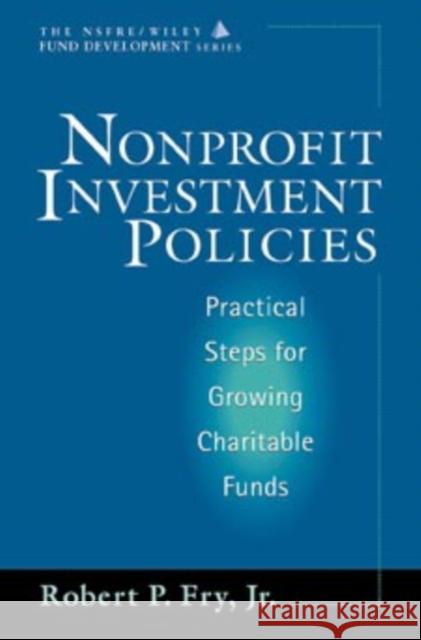Nonprofit Investment Policies: Practical Steps for Growing Charitable Funds (Afp/Wiley Fund Development Series) » książka
Nonprofit Investment Policies: Practical Steps for Growing Charitable Funds (Afp/Wiley Fund Development Series)
ISBN-13: 9780471178873 / Angielski / Twarda / 1998 / 302 str.
Nonprofit Investment Policies: Practical Steps for Growing Charitable Funds (Afp/Wiley Fund Development Series)
ISBN-13: 9780471178873 / Angielski / Twarda / 1998 / 302 str.
(netto: 488,00 VAT: 5%)
Najniższa cena z 30 dni: 509,25
ok. 30 dni roboczych.
Darmowa dostawa!
An accessible and thorough guide to nonprofit investment policy for nonfinancial managers --essential information for maintaining fiscal health and the public trust
The first book to discuss the development of investment policies specifically for nonprofit organizations, Nonprofit Investment Policies helps directors, trustees, and development officers at nonprofits create sound, comprehensive policies for their financial advisors. Covering every element of investment strategy for nonprofits, the book explains investing legal concerns, the investment environment, the internal organization of an efficient charity, how to get started in investment, how to use investment successes as a fund-raising tool, and much more.
Written in language that both financial and nonfinancial managers can understand, Nonprofit Investment Policies includes:
* An exploration of the unique characteristics of nonprofit resources, including endowment management, planned gifts, and socially responsible investing
* A full examination of the legal issues involved in nonprofit investment -- the tools officers and directors of charities need to protect themselves from investment liability in an increasingly litigious world
* Case studies from the real world of nonprofit investment showing successful policies in action --and failures that display policy pitfalls to avoid
* Advice on finding and hiring outside advisors, plus an explanation of the essentials of investment accounting and performance reporting
* Tables and checklists to guide nonprofit managers in fiscal decisionmaking.
If a nonprofit organization has any money in the bank, the organization already has an investment policy, however informal. For many nonprofits, managing extra money is such a novel concept that they don't take full advantage of their on-hand resources. But as organizations grow and their financial conditions improve, decision-makers must consider how best to manage and invest these additional funds. The nonprofit organizations Robert P. Fry, Jr. works with understand investing and how to spot and avoid shady investments, as well as how to safeguard assets. Written in language that both financial and non-financial managers can understand, Nonprofit Investment Policies explains the basics of investing, how investing for nonprofits is unique, and how to work with an investment manager.
This is not another get-rich-quick book about picking stocks and bonds. Rather, it is a book on how nonprofits can make good decisions. In the world of investments, good decisions are ultimately more important than the occasional wizardry of an outstanding portfolio manager, for unlike such wizardry, good decisions can be replicated in good times and bad by any organization that is committed to doing so --now, months from now, and years from now.
Clearly written investment policies codify these good decisions, increasing returns on investments and protecting boards and executive directors from possible litigation over the handling of the nonprofit's assets. Fry's principal goal is to provide sufficient information on the overall investment environment so that any organization can comfortably implement investment policies. Nonprofit Investment Policies includes sample investment policies plus analysis and guidance on these policies to help organizations develop the policies that most closely fit their goals and objectives, resources, time constraints, risk tolerance, and limitations.











